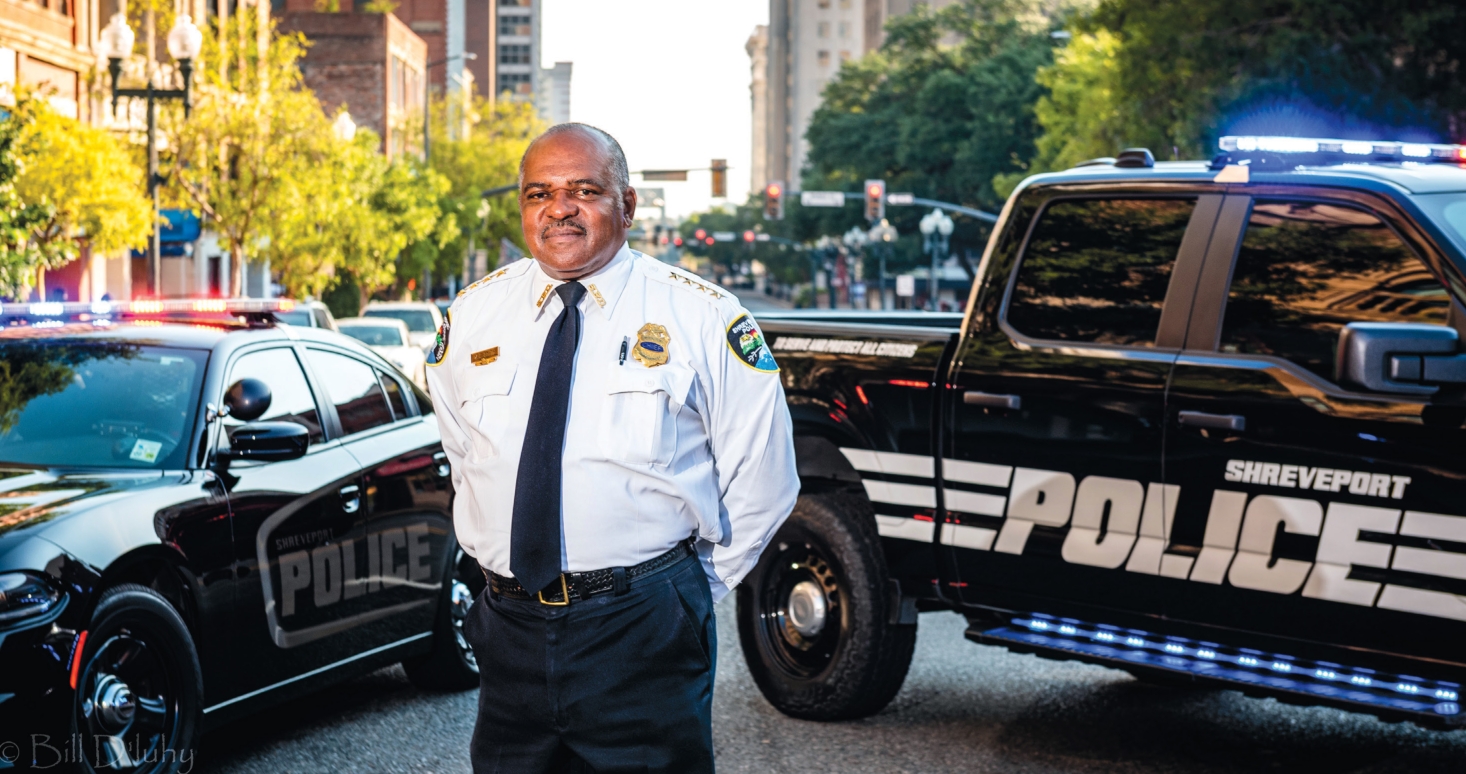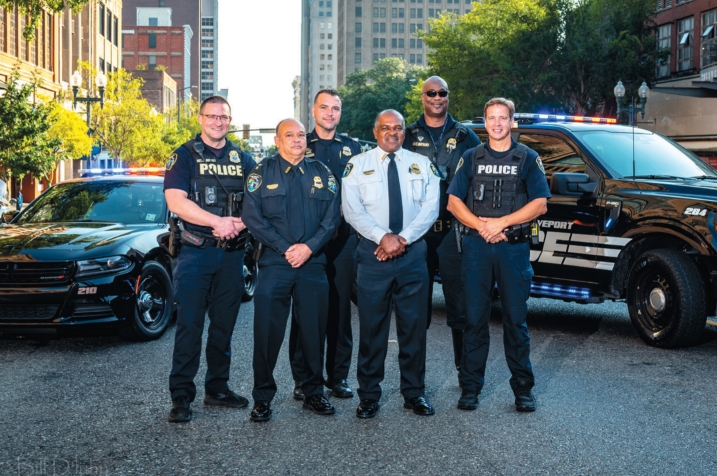From Rookie to Police Chief

Wayne Smith was appointed police chief in 2022.
Wanting to be the best he could be, SPD Chief Wayne Smith achieves his destiny
It was standard protocol.
After roll call, the police officers who were assigned to hit the streets went to the patrol desk. That’s where they got the keys to the car they were using that day.
But Wayne Smith, a rookie cop on the job for less than a year, didn’t look like the other officers.
“I stood there and waited for the lieutenant to acknowledge my presence, Smith said. “After a couple of minutes, he finally did. He leaned over the desk and said, ‘What ya need, boy?’”
In Shreveport in the 1970s, when a white man called a black man “boy,” he wasn’t being endearing.
“I said, ‘Sir, roll call is over.
I need my car to go to my assignment.”
The lieutenant looked over his desk and down.
“That looks like a nice enough car on your feet — what you’re wearing.”
Smith turned around, left the police station, and walked to where he was going, unfazed by the racism shown by his commander.
“It was simple for me, but difficult for some. I didn’t know life any differently. That was the environment I was raised in, that I was born in, and I really didn’t know life any different.”
In the 1970s, the federal government required the Shreveport Police Department to become more diversified. Not everyone thought that was a good thing.
“One of the first training officers said, ‘We didn’t hire you Negroes. We don’t want you here, and we ain’t got to keep you. It didn’t move me that much. I’m going to be here. I’m going to do my job. When he said, ‘Don’t touch nothing, don’t say nothing, don’t do nothing until I tell you to,’ my answer was, ‘Yes, sir.’”
Smith, 66 years old and in his 45th year with SPD, has come a long way from the Red River Parish farm where he was raised and where he worked as a child. Born to a unmarried high school student who “fixed hair,” Wayne was adopted when he was around 2 years old, although there wasn’t any paperwork. “They didn’t do that back then. They didn’t understand legalities. A handshake was good enough.
“My foster mother went one Saturday afternoon to get her hair done, and she saw me beneath the kitchen table, eating crumbs off the floor. She asked my mother, ‘Why don’t you let me keep that little boy?’ Without question, my mother said ‘OK.’”
The lady would take Smith for a couple of weeks, then bring him back. Finally, Smith’s biological mother said, ‘I thought you wanted him? I give him to you.’ She was shocked. She was stunned. My mother handed her a brown paper bag with what things I had. She took me on back to the farm, and that’s where I was ever since.”
One of eight children, Smith was baptized in the Red River.
“My foster mom got to shouting on the banks of the river and hit another lady and knocked her down the hill and into the water. She was so happy to see her baby accept Christ.” Smith only saw his real mother a couple of days a year when he would go to her house and play with his siblings.
“I remember how bad it hurt when (my foster) momma would come get me. ‘Well, it’s time to go.’ It hurt so bad because I was having a great time with my brothers and sisters. I just could not understand for the life of me, why they got to stay and I had to go?”
Life on the farm was tough. Smith picked cotton, hoed cotton, drove a tractor and raised cattle. Until he was 13 and his foster parents bought a place of their own, Smith didn’t have electricity or running water.
“I had not been exposed to anything else. I didn’t know life any other way.”

Wayne Smith battled racism in the 1970s to reach the position of chief of police.
But by the time Smith was a young adult, he knew there had to be another way to live. One day, Smith heard a radio commercial announcing SPD was hiring. The next morning, in pouring rain, Smith got on his motorcycle and headed north. On the outskirts of town, he stopped to get gas. Smith gave the clerk five dollars, which Smith had borrowed from the man for whom he worked.
The clerk gave Smith his change — a $2 bill.
Forty-six years later, Smith reached into the back pocket of his blue uniform pants, pulled out his wallet and carefully removed that greenback, which for the most part was still intact.
“I look at it periodically. It gets me emotional because I am so thankful for how far life has taken me. At that point, I was at rock bottom in life. I was broke, busted and hungry.”
But Smith had, as he puts it, “a passion for opportunity.” Smith certainly made the most of that passion, rising through the ranks as a corporal, sergeant, lieutenant, captain and assistant chief. In 2022, after serving several months as the interim chief, Smith was appointed the chief.
“It was my destiny. ... I got bit with the bug and wanted to be the best I could be. I found mentors who were doing great things in this community, and I wanted to emulate their actions.”
A high school graduate, Smith noticed many of those mentors had a higher level of education. So, he took advantage of a program in which the city helped pay for its employees to attend college. Smith took night classes at six schools on his own time. We’re not talking online courses. We’re talking the old-fashioned way — driving to campus and sitting in a classroom.

Supporting cast: Sgt. Mason Guy, Deputy Chief Brian Monette, Cpl. Chris Bordelon, Chief Wayne Smith, Sgt. Sederick Mathews and Cpl. Brian Michael
I wanted to be better than I was. I wanted to understand life a lot better. I did not want to be embarrassed. I wanted to feel just as proud of myself in the company of other people who spoke very well, wrote very well and could read very well. I wanted to feel good about myself that I was just as good and competent as anyone else.”
Smith earned an undergraduate degree in organizational management from Wiley College in Marshall, Texas. But he wasn’t satisfied.
“I had a thirst, a desire, to learn more. To grasp more. To be challenged more.”
So, Smith earned a master’s degree in business from Centenary College of Louisiana.
“I’m so proud. It was the best education experience I could have ever had.”
Married for 40 years and a father to three children and grandfather to five, Smith said he’s had opportunities to leave Shreveport for better-paying jobs, both in and out of police work. But he couldn’t bring himself to take what Shreveport gave him — the path to a college education — and run.
“I was very thankful that somebody in this city had the wisdom to take a chance on me. To give me an opportunity. To provide a way for me to be somebody different — to do better. An investment in me was an investment in this city. So, I made a personal pledge to myself before my God that I was going to spend all of my productive years giving back to a community that gave to me.”
That includes often getting out from behind his desk and joining officers at crime scenes.
“Many times, I begin to let the popularity of being the police chief work for us. People recognize me, but they wouldn’t recognize someone they hardly ever see. I begin to work the crowd, going over and shaking people’s hands. I begin to walk the streets and meet people. Quite honestly, they give me wonderful information related to an event that investigators may not have gotten otherwise, just because they’re happy to see me.”
Smith has come a long way since those hard days growing up on a farm. He doesn’t promise to have all the answers when it comes to achieving success, but he offered these suggestions:
“Get through struggles. Put the past behind you. Don’t harbor on what has occurred, because you can’t change it. Always focus on the positive side of life. Keep your eyes focused on the future and the greater possibilities. Find peace with yourself. That’s very important. Probably the most important thing. Find yourself a purpose in life and pursue that purpose to the fullest, no matter what it takes.”
In other words, be like Wayne Smith.
